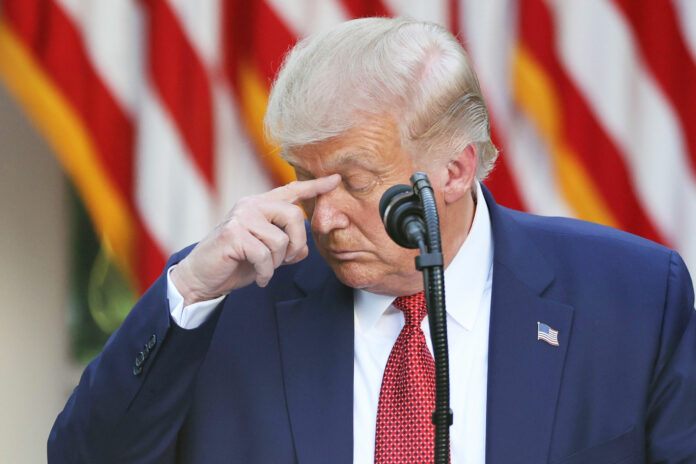U.S. President Donald Trump attends a news conference in the Rose Garden at the White House in Washington, July 14, 2020.
Jonathan Ernst | Reuters
Manhattan District Attorney Cyrus Vance Jr. asked the U.S. Supreme Court on Wednesday to immediately send to lower federal courts its recent ruling that President Donald Trump is not immune from having his tax returns subpoenaed, warning a delay could thwart the filing of possible criminal charges.
Vance’s action came hours after Trump’s lawyer formally told a federal judge that Trump will fight to keep the DA from obtaining the president’s tax returns, and argued in a new court filing that as part of that battle Trump is entitled to know why Vance’s prosecutors want the records.
The Supreme Court ruled last week 7-2 that Trump does not have absolute immunity as president from being investigated by a state prosecutor while in office, and from being subject to a subpoena like the one for his tax records issued by a Manhattan grand jury to his accounting firm. Vance’s prosecutors had sought the subpoena as part of an ongoing criminal investigation they are conducting.
The Supreme Court opinion left the door open for Trump to continue challenging the subpoena to the Mazars USA firm on other grounds.
Normally, the Supreme Court waits for a minimum of 25 days before its opinions take effect.
But Vance, in his request, wants that to happen much sooner “to ensure that the state grand jury has access to all of the evidence to which it is entitled in a timely fashion – thereby minimizing any risk that criminal conduct will go unpunished.”
He warned that if there is a lag in transmitting the ruling, and a related delay in a lower court adjudicating Trump’s expected new challenge to the subpoena, “Given the age of many of the transactions at issue in the grand jury’s investigation, issues could arise in the near future concerning the applicable statutes of limitations.” Those statutes bar the filing of charges related to certain kinds of crimes.
And Vance said if there is too long a delay Trump might get “the absolutely immunity that this court rejected.”
Trump lawyer William Consovoy, in a joint update with Vance’s office to Judge Victor Marrero, the Manhattan federal court judge overseeing the subpoena case, laid out several possible grounds for the president to continue his effort to block or reduce the scope of the subpoeana for the tax returns. The filing came on the deadline this year for Americans to file their federal income tax returns.
Consovoy said the potential arguments against the subpoena include claiming that it was not “properly tailored,” that it was “motivated by a desire to harass or is conducted in bad faith,” is designed to retaliate against Trump, and that compliance with the demand would “impede his constitutional duties.”
“The President intends to raise some or all of these arguments in his forthcoming Second Amended Complaint,” Consovoy wrote.
The attorney said that in developing a “factual record” for ruling on the claims, the judge and Trump are entitled to know why Vance “wants the information, why and how much the State needs the information.”
Vance is understood to be investigating, at the very least, whether the Trump Organization improperly accounted for a $130,000 hush money payment made by Trump’s then-lawyer Michael Cohen in 2016 to a woman who claimed to have had a sexual encounter with Trump.
Trump has denied the claim by the woman, porn star Stormy Daniels. But he and his company reimbursed Cohen for the payment to her.
Vance has not explicitly said what he is investigating, or that the probe is limited to the hush money payment.
His investigation is seen as a pointed threat to Trump, who has, unlike every other president since the mid-1970s, refused to release his income tax returns.
Consovoy wrote in the filing that, “The President should not be required … to litigate the subpoena’s breadth or whether it was issued in bad faith without understanding the nature and scope of the investigation and why the District Attorney needs all of the documents demanded.”
Vance’s office, in an argument in the same filing, urged Marrero to quickly resolve the dispute, as he previously did in ruling that Mazars had to comply with the subpoena despite Trump’s objections.
Vance’s lawyer, Carey Dunne, cited the “continuing concerns about the potential loss of critical evidence and expiration of statutes of limitations” if the subpoena is further delayed.
Dunne also said the judge “has already found that there was no demonstrated bad faith, harassment, or any other unusual circumstances” in the subpoena request.
And Dunne wrote said that “except in extreme cases, the law does not permit the recipient of a grand jury subpoena to conduct discovery into the bona fides or motivations behind such a subpoena, and nothing in the Supreme Court’s decision suggests that this President should be able to do so here.”
Jay Sekulow, another lawyer for Trump, declined to comment to CNBC, saying the court filing spoke for itself.
— Additional reporting by CNBC’s Tucker Higgins






